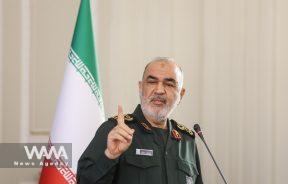Sanctions and Distortions
WANA (May 16) – Ayatollah Khamenei, the Supreme Leader of the Islamic Republic of Iran, has frequently addressed the issues of sanctions and the distortion of his statements in various speeches.
An analysis of his remarks and the reactions from his office regarding such distortions reveals that the two topics—sanctions and distortions—are closely connected in his perspective. Below are some of the key points:
1. Distortion of Remarks and Its Impact on Domestic and Foreign Policy
The Iranian leader has repeatedly criticized the distortion of his statements by media outlets and political groups. For instance, when he spoke about ways to counter sanctions, some media selectively quoted phrases like, “We must not delay even for an hour (in neutralizing sanctions)”, implying that he was urging the government to rush into negotiations with the U.S. However, his main emphasis was on neutralizing sanctions through domestic efforts, not relying on promises from adversaries.
His office also responded by publishing posters condemning these distortions, stressing that the aim of such misinformation is to mislead public opinion and weaken national unity.
2. Priority of Neutralizing Sanctions over Lifting Them
Ayatollah Khamenei has consistently emphasized that lifting sanctions is in the hands of the adversary, but neutralizing them is possible through internal planning. He has clearly stated:
“Rather than focusing on lifting sanctions, we should concentrate on neutralizing them.”
“Neutralizing sanctions is within our control, and there are effective ways to do so.”
This approach indicates that resolving the issue of sanctions requires internal measures and reducing dependence on hostile powers, rather than accepting imposed conditions through fruitless or harmful negotiations.
3. Distortion as an Obstacle to National Unity
The Supreme Leader has warned that spreading division and distorting officials’ statements weakens national unity and emboldens enemies. He has urged officials:
“Officials must not fragment the nation… They should resolve their differences through internal dialogue.”
“A unified voice must be heard from the country to discourage enemies.”
In other words, distortions not only hinder economic solutions but also fuel division and disrupt the focus on neutralizing sanctions.
4. The Role of Parliament and Government in Confronting Sanctions
In a meeting with members of the 12th Parliament, he emphasized the critical role of Parliament in supporting the government and enacting anti-sanction legislation, stating:
“We can counter and neutralize sanctions through honorable means… Parliament must play a role in this effort.”
This reflects the need for coordination among domestic institutions and avoidance of media controversies driven by distorted narratives.
According to the Supreme Leader, solving the country’s problems depends on national unity, neutralizing sanctions through internal capacities, and avoiding reliance on adversaries. Therefore, the fight against distortions is not a condition for lifting sanctions, but a prerequisite for strengthening solidarity and implementing resistance strategies.












